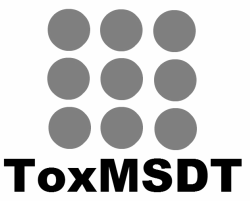Knowledge Check Solutions
1) Enzymes - This is the correct answer.
Enzymes are proteins that catalyze nearly all biochemical reactions in the body.
2) The substrate name with the type of chemical reaction - This is the correct answer.
Enzyme names end in "ase" and usually combine the substrate acted on and the type of reaction catalyzed.
3) Phase I reactions generally add a functional structure whereas Phase II reactions conjugate the substance - This is the correct answer.
Phase I reactions are generally reactions which modify the chemical by adding a functional structure. This allows the substance to "fit" into the Phase II enzyme so that it can become conjugated (joined together) with another substance. Phase II reactions consist of those enzymatic reactions that conjugate the modified xenobiotic with another substance.
4) A substrate losses electrons from an oxidation reaction whereas it gains electrons by a reduction reaction - This is the correct answer.
Oxidation is a chemical reaction in which a substrate loses electrons. Reduction is a chemical reaction in which the substrate gains electrons.
5) Glucuronide conjugation - This is the correct answer.
Glucuronide conjugation is one of the most important and common Phase II reactions. Glucuronidation is a high-capacity pathway for xenobiotic conjugation.
1) Enzymes - This is the correct answer.
Enzymes are proteins that catalyze nearly all biochemical reactions in the body.
2) The substrate name with the type of chemical reaction - This is the correct answer.
Enzyme names end in "ase" and usually combine the substrate acted on and the type of reaction catalyzed.
3) Phase I reactions generally add a functional structure whereas Phase II reactions conjugate the substance - This is the correct answer.
Phase I reactions are generally reactions which modify the chemical by adding a functional structure. This allows the substance to "fit" into the Phase II enzyme so that it can become conjugated (joined together) with another substance. Phase II reactions consist of those enzymatic reactions that conjugate the modified xenobiotic with another substance.
4) A substrate losses electrons from an oxidation reaction whereas it gains electrons by a reduction reaction - This is the correct answer.
Oxidation is a chemical reaction in which a substrate loses electrons. Reduction is a chemical reaction in which the substrate gains electrons.
5) Glucuronide conjugation - This is the correct answer.
Glucuronide conjugation is one of the most important and common Phase II reactions. Glucuronidation is a high-capacity pathway for xenobiotic conjugation.

